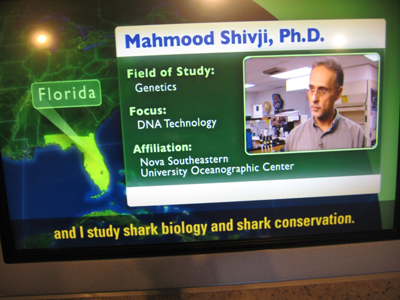
Mahmood Shivji’s work is featured in the Smithsonian Ocean Hall.
The exciting discoveries of modern biotechnology are an extension of practices that are thousands of years old — such as using yeast in bread making, fermentation in wine and beer production, and even domestication of animals.
Today, biotechnology is a term used to describe a broad range of technologies that modify living things for human purposes. Examples of biotechnology at work today can be seen in agriculture, the pursuit of life-saving drugs, and even alternative energy development.
Marine biotechnology refers to those efforts which involve resources from the sea. Florida Sea Grant actively supports marine biotechnology research and education where it falls within the scope of our 2009-2013 Strategic Plan. Biotechnology projects are underway to identify pollutants in the environment, develop forensic tests to identify illegally harvested marine species, and produce rapid molecular tests for seafood safety.
Mahmood Shivji’s Work Featured in Smithsonian’s Sant Ocean Hall
Mahmood Shivji’s Sea Grant-sponsored research in developing DNA analysis of sharks is featured in the inaugural exhibits of the newly opened Smithsonian’s Sant Ocean Hall in Washington, D.C.
Shivji, a professor at Nova Southeastern University, uses genetics to help NOAA determine the origin of harvested sharks and to sustainably manage the shark fishery. Many shark populations throughout the world face sharp decline, driven by the popularity of shark fin soup, which has created a highly lucrative but unsustainable market for shark fins.
Shivji has developed a rapid and reliable method of DNA analysis to identify shark species from even the smallest bit of shark tissue — fins, carcasses, and other body parts. The method gives resource managers information they need on shark populations so they can monitor the commercial shark trade, and begin to develop comprehensive management strategies.
The DNA analysis technique also puts teeth in NOAA’s efforts to prosecute U.S. fishing vessels suspected of trading in protected shark species.
In a surprising aside, Shivji’s team also discovered some sharks can resort to non-sexual reproduction when mates cannot be found, as happens when a population is shrinking.
Visit Mahmood Shivji’s lab at the Guy Harvey Research Institute.
More Links on Marine Biotechnology Research in Florida
Marine Biotechnology Research in Florida Sea Grant 1996-2003: An Outreach and Communication Foundation (228k pdf). Marine biotechnology is an exciting area of scientific discovery and application serving a broad variety of fields including medicine, seafood production and safety, environmental monitoring and conservation of ocean fisheries. This publication features 24 major studies (21 started since 1998) funded by Florida Sea Grant, summarized in easy-to-read language useful to lay and scientific readers alike, in a format that describes research goals, methods and breakthroughs, with publications and student degrees indicated.
Marinebiotech.org is a web site developed by the National Sea Grant College Program and Harbor Branch Oceanographic that provides a wealth of information about relevant topics in the field of marine biotechnology, from the discovery and development of new medical treatments using chemicals derived from marine organisms to new technologies for environmental monitoring.
The Promise of Marine Biotechnology in Florida, is a 16-page magazine that offers a well-illustrated review of major scientific advances by Florida’s network of research faculty and students. Topics include potential medical products from ocean organisms and the use of genetic fingerprints and molecular sensors to detect product quality and environmental contaminants.


